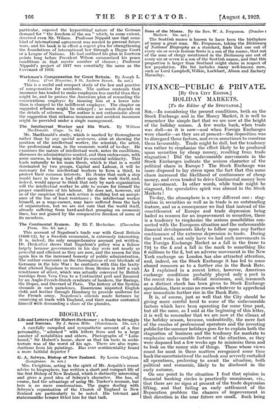Mr. MacDonald's study, which is marked by thoroughness rather than
by any special acuteness, aims at showing the position of the intellectual worker, the scientist, the artist, the professional man, in the economic world of to-day. He examines the nature of intellectual work, notes its conditions, discusses its administrative control, and then endeavours, with some success, to bring into relief its essential solidarity. This leads naturally to his main thesis, which is that in a world dominated by two groups, .Capital and Labour, it will be necessary for the intellectual workers to form a third, to protect their common interests. He denies that such a step would have in time a bad effect upon the work itself, and, indeed, would appear to think that only by such organization will the intellectual worker be able to secure for himself the proper conditions of his labour. He does not, however, rid us of the suspicion that such action is nothing but an accept- ance of the line of least resistance ; the intellectual worker himself, as a wage-earner, may have suffered from the lack of organization, but we are not sure that the world itself, already suffering from hard-and-fast grouping on economic lines, has not gained by the comparative freedom of some of its members.


































 Previous page
Previous page